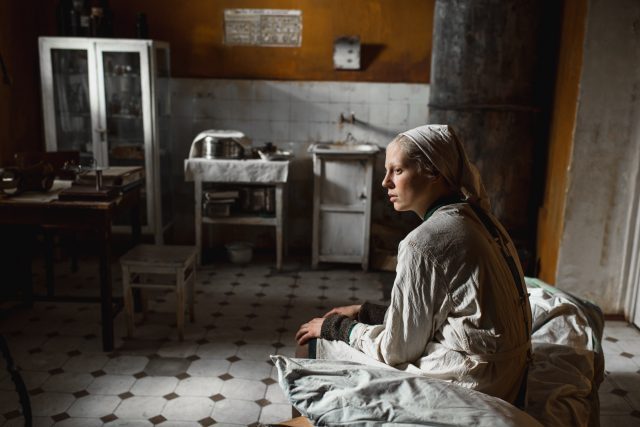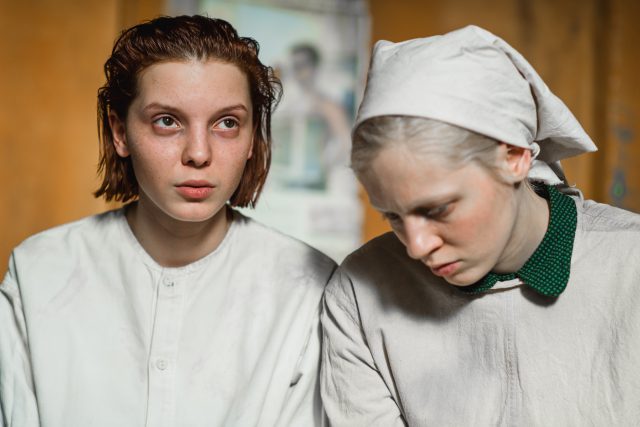
Iya (Viktoria Miroshnichenko) deals with horrific tragedy in Kantemir Balagov’s Beanpole
BEANPOLE (Дылда) (Kantemir Balagov, 2019)
Film Forum
209 West Houston St.
Through February 11
212-727-8110
filmforum.org
Russia’s official submission for the Oscar for Best International Film, for which it was shortlisted, Kantemir Balagov’s Beanpole is an unsparing look at PTSD in women, here specifically in WWII but also more generally as mothers and caretakers. In 1945 Leningrad, Iya (Viktoria Miroshnichenko) is a very tall, quiet, former anti-aircraft gunner working in a military hospital for men with severe injuries. She is particularly drawn to Stepan (Konstantin Balakirev), who is paralyzed. She has a condition in which her body freezes, as if trapped in a limbo between life and death, and it horrifically leads to tragedy. Iya’s best friend and lover, Masha (Vasilisa Perelygina), returns from the front, bearing a frightening scar. She deviously sets out to have a child, involving the oddball Sasha (Igor Shirokov) and the head of the hospital, Nikolay (Andrey Bykov), which confuses and deeply upsets Iya.

Masha (Vasilisa Perelygina) and Iya (Viktoria Miroshnichenko) try to put their lives back together after fighting in WWII in Beanpole
Inspired by Belarus author Svetlana Alexievich’s Nobel Prize-winning 1987 book The Unwomanly Face of War: An Oral History of World War II, Balagov’s second film, following his 2017 drama, Closeness, is a thoroughly unpredictable and purposefully uncomfortable journey into the minds of men and, more specifically, women shell-shocked by war. In their film debuts, Miroshnichenko and Perelygina are mesmerizing; cinematographer Ksenia Sereda zeroes in on Miroshnichenko’s head and Perelygina’s face as if they are characters unto themselves. The film’s palette is ochre-based, with explosions of bright yellows, reds, and especially greens — the color of rebirth, renewal, and envy — which pop up in wallpaper, paint, Iya’s sweater, and Masha’s dress. It’s a world in which women, after experiencing such pain and suffering, are expected to get married and pregnant amid all the death surrounding them. Balagov won Un Certain Regard’s Best Director prize at the Cannes Film Festival for this stark, brutal portrayal of average people looking for love amid the ruins. It might be set in 1945, dealing with the aftereffects of the Siege of Leningrad and what it did to the soul of the Russian city, but its exploration of the physical and psychological trauma of war is as relevant today as it was then.